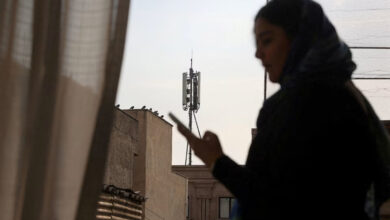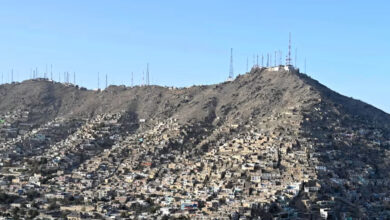The much-anticipated daily newspaper Al-Tahrir hit newsstands Sunday, marking the strong return of defiant editor Ibrahim Eissa, who was forced out of his position at the independent daily Al-Dostour a few months before the fall of former president Hosni Mubarak.
The 18-page-long newspaper is named after Tahrir Square, the epicenter of the Egyptian revolution that culminated in Mubarak’s resignation in February, and is co-owned by prominent publisher Ibhraim al-Moalem, chairperson at the independent Al-Shorouk daily.
Under Mubarak, Eissa stood out as one of the most outspoken critics of the ruling regime. Most of his writings and talk shows leveled scathing and direct criticism at the former president and his family. In retaliation Eissa was sentenced to two months in prison in 2008 on charges of publishing false rumors about Mubarak’s health. Later, Mubarak pardoned him in a move widely seen as an attempt to tame Eissa.
But the now 45-year-old journalist maintained the same tone and continued to face sporadic harassment. In October 2010, Eissa was sacked from his position as editor-in-chief of the privately-owned Al-Dostour after the paper was sold to Wafd Party chairman Al-Sayyed al-Badawi. Rumors circulated that Badawi kicked Eissa out in a good-will gesture to Mubarak. Eissa told the press he was dismissed a few hours after he was told not to run an article by leading opposition figure then Mohamed ElBaradei.
According to Ibrahim Mansour, Al-Tahrir's executive editor and Eissa’s longtime colleague at Al-Dostour, the new paper seeks to provide “deeper” news analysis rather than mere event coverage. Al-Tahrir also hopes to attract younger generations, which remain aloof from printed media and consume news mainly from social networking sites, Mansour said.
“This generation follows Twitter and Facebook. They lost faith in the print media because it served the regime. I’m trying now to attract those readers back to the print media because it is still important,” he said.
Al-Tahrir’s first issue suggests that it will be a replica of Al-Dostour in terms of its opinionated content and sarcastic flourishes. On its first day, the paper featured a satirical column by outspoken writer Belal Fadl where he leveled ruthless criticism of Prime Minister Essam Sharaf’s cabinet.
“We were unfair to Sharaf when we labeled his cabinet as a revolutionary one. Out of accuracy, we should have named it a transitional cabinet. Is it not making the transition from worse to worst?” wrote Fadl.
By the same token, Eissa’s column discredits the cabinet’s as well as the ruling Supreme Council of the Armed Forces’ claims about plots being staged to undermine stability.
“A plot is underway… This is what we have to believe according to SCAF and Sharaf’s cabinet. It might be true, why not? But to convince us, [they] have the small mission of answering two simple questions: Who are the plotters? Where is the plot? Where are those plotters?” Eissa wrote.
“The real plot is the police’s and cabinet’s attempt to blame their failure and inability to run things on conspiracies…” he concluded.
Al-Tahrir comes to the market less than a week after police had clashed with protesters in Tahrir Square. Central Security Forces deployed tear gas against protesters who threw stones and Molotov cocktails. The violence, which left hundreds injured, outraged many observers because it brought back to mind memories of policemen using excessive force against protesters during the early days of the recent revolution.
“We did not have any red lines in the past under Mubarak, so we will not have any in this phase,” said Mansour of his editorial philosophy. “The truth has to be disclosed, we want a new life where the press can play a real role in exposing corruption and building a free society.”
Even the military will not be exempt from criticism.
“As long as the SCAF is running the country and holding executive and legislative authorities, I have the right to criticize it,“ said Mansour.
Al-Tahrir daily is one manifestation of the boom in media outlets that followed Mubarak’s ouster. Several satellite channels and newspapers have been recently launched or in the process of launching.
The newspaper is Eissa’s second media project since the outbreak of the revolution. In recent months he has been hosting a nightly news talk show on the privately-owned satellite channel Al-Tahrir, first launched in February. The channel is unaffiliated with the newspaper.
“The launch of any new independent media outlet is a gain for freedom of expression especially if this outlet is led by Ibrahim Eissa. Eissa is the mentor of one of the most courageous schools of journalism,” said Essam Eddin Hassan, research director at the Cairo Center for Human Rights Studies.
However, most of these new media organizations are operating under the same restrictive legislations, according to Hassan.
“The same despotic structure that we inherited from Mubarak is still there,” said Hassan, referring to old laws that have not yet been abrogated. There are nearly 30 clauses in Egyptian law that can send a journalist to jail, he added.
“If those running the country want to prosecute journalists, they can easily invoke that legislation,” said Hassan.
In recent months, the military prosecutor has summoned at least five journalists due to the content of their shows or reports. In one incident, a blogger and a TV host were summoned because the former accused the military of torturing protesters.
“In the past, the red lines had to do with the president. But today, we exchanged the president with anything related to the military. Hence, we are still in the same position,” he added.
In the meantime, Hassan argued that all media has to be regulated somehow to ensure that they are professional, as in any democratic country.
“It’s not just about opening new platforms. The question is also about how professional these outlets are and to what extent they abide by codes of ethics that are set by journalists themselves,” he explained.
According to Yasser Abdel Aziz, a media expert, a proliferation of media outlets is a normal phenomenon in countries moving from authoritarianism to democracy. However, this boom does not always correspond to a resurgence of professional media that covers divergent viewpoints.
“So far, the outlets emerging in Egypt show that the rise in freedom of expression does not correspond with the level of media professionalism,” he said, explaining that much media has emerged to serve the political agendas of their owners rather than provide the public with balanced content.




